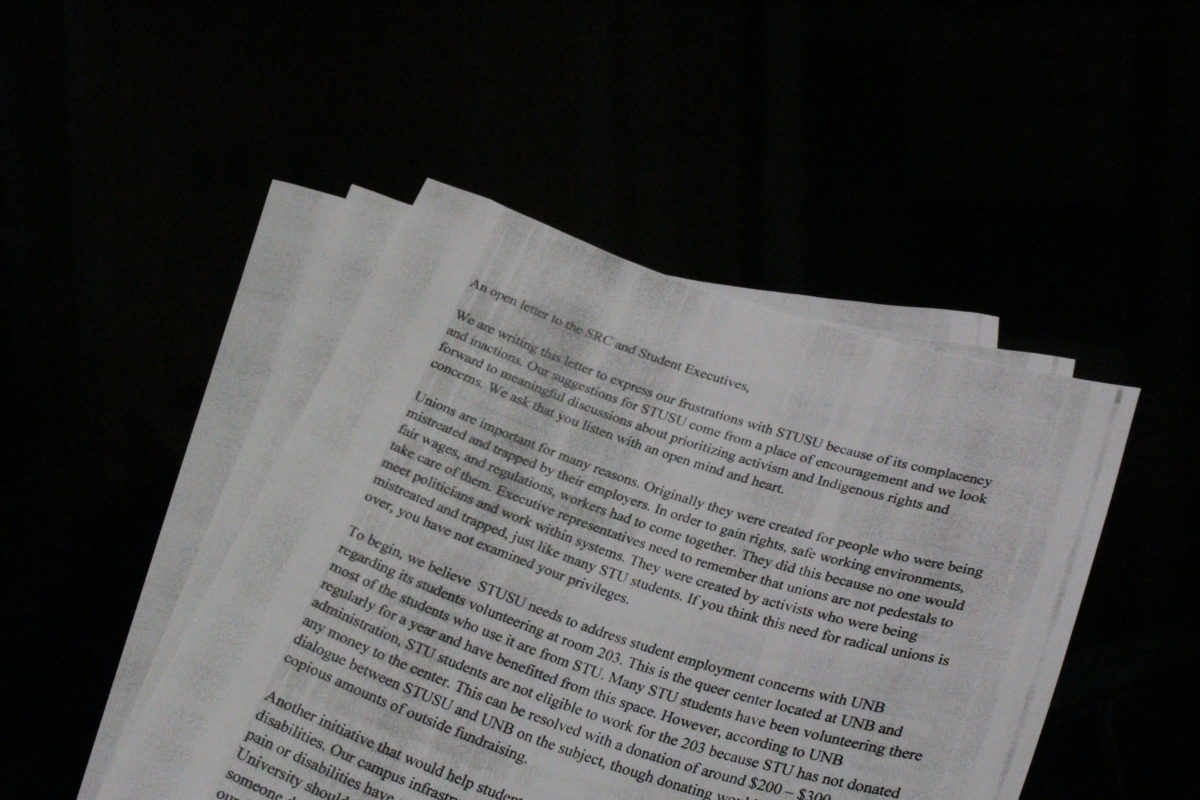Students at St. Thomas University say they don’t feel represented by their student union and disagree with its form of advocating.
Third-year Naomi Gullison and fourth-year Ariel Ottens read a three-page letter to the Student Representative Council at its Feb. 10 meeting, expressing frustration with St. Thomas University Students’ Union for its “complacency and inactions.”
In it, they called on STUSU to improve accessibility on campus, advocate for more mental health counsellors, fight tuition fees, push for more professors in the Native Studies department and make Native Studies courses mandatory and decolonizing the university.
They also posted the letter on Facebook and are circulating a petition demanding STUSU leave the New Brunswick Student Alliance and Canadian Alliance of Student Associations. The petition has 50 signatures as of Feb. 18. The students have also spread their messages by writing on whiteboards and buildings around campus and distributing papers.
Ottens said “a lot of students are in a crisis” in terms of debt, tuition and mental health.
“I’ve been so worried about fellow students because we need a union who radically represents us and really takes care of us because so many students are suffering and so far I’ve seen the union acknowledging it verbally but not taking that into action,” Ottens said.
Ottens said an executive member on STUSU encouraged them to bring their concerns forward.
STUSU president Brianna Workman said she heard earlier in the week that some students were interested in bringing a letter forward.
“There was a ton in that letter that I agree are issues [but I] don’t agree with [the students] about the best way to address them,” Workman said.
Workman made a post on Facebook on Feb. 13 because she didn’t want “incorrect information” to spread.
“I did not state at the Students’ Representative Council (SRC) meeting on Sunday, February 10, nor have I ever stated, that I am not in support of lower tuition for STU students,” said Workman’s post.
“It is a fundamental role of my position to advocate for students to have affordable tuition and this is a responsibility I take extremely seriously.”
In an interview with The Aquinian, Workman said tuition should be targeted to people who need it the most.
“There’s a lot of research and evidence to suggest that those from high income backgrounds actually benefit more from universal free tuition than those in low income backgrounds,” she said.
“Even if you have a progressive tax system where the rich are paying more, that doesn’t eliminate the fact that low income folks are still subsidizing that tuition subsidy for high income students through their taxes.”
Jacob Patterson, a third-year sociology student who helped work on the letter, said the idea that universal free tuition increases inequality is “absolutely bogus.”
“It’s something that has worked in other parts of the world and even in poor countries,” Patterson said.
“This is something that has happened before and I challenge anyone to find an example of universal free tuition making any equality worse.”
Ottens said there are a lot of students who get left behind with targeted free tuition.
“Look around you at STU, at how many people are being forgotten in that system and can’t work in that system,” Ottens said.
“Their parents maybe make a little bit more, but aren’t paying for their education and they’re completely on their own and they’re stressed out and they’re having breakdowns.”
In their letter, the students said STUSU needs to resign from CASA and the NBSA in order to better advocate for free tuition. They want STUSU to take a more “radical” approach to activism.
“We may very well be seeing the last of the student movement in Canada,” their letter said.
“If we are, then we need to start talking about whether we want to die fighting on our feet, or begging on our knees. We need to leave CASA and start organizing.”
But Workman said the NBSA and CASA are doing effective advocacy work.
“There is some huge evidence to suggest that these organizations are doing extremely effective work, are very consistently seeing provincial and federal governments come out with budgets that are addressing students’ concerns,” Workman said, adding that the free tuition program and tuition relief for the middle class wouldn’t exist without NBSA and CASA.
“I think everyone has a right to their opinion and folks can certainly believe the union is complacent. It’s a point I disagree with.”
Ottens said she doesn’t feel alone in the fight and that students have reached out to her after she posted the letter on Facebook.
“They were like, ‘Thank you so much for saying this stuff because I’m exhausted, I’m tired, and I’m working full-time and going to school full-time. But everything that you said in your letter represents everything that I want my union to believe in.’”
Workman has offered to talk with the students about their concerns. She believes a mutual and respectful conversation about the issues should take place.
“Their letter did open asking for the SRC to listen with respect and listen with an open heart and I would like them to do the same,” Workman said.
“I think that in order to have any type of productive dialogue about any type of issue, there has to be some type of give and take.”

